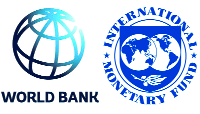War complicates low income countries
WB-IMF annual meeting evaluation
Mahfuja Mukul: The negative impact of war complicates the policy environment of low-income countries. Food and energy security, commodity supply chain, macro-financial stability, inflation and growth are also adversely affected. Therefore, the world economy must be united to combat the harmful effects of war. Spain’s First Vice President and Minister of Economy and Digitalization Nadia Calvino called for this unity in the President’s speech at the World Bank-IMF Annual Conference. He said many countries are derailing again after overcoming the Covid-19 pandemic and economic recession due to war and the complex global situation. This may ultimately hinder the achievement of sustainability goals.
The World Bank-IMF meeting ended in Morocco on Saturday at 12 pm (2 pm Bangladesh time). President gave a speech in the presence of IMF Managing Director Kristalina Georgieva. The biggest meeting of the economic zone started on October 9. It announced that the next winter meeting will be held in April 2024. It is scheduled to be held in Washington DC, USA.
In the closing speech, it is also said that in the global context, everyone, including low-income countries, should give importance to four sectors. These include sustainably reducing inflation, safeguarding financial stability, protecting the most vulnerable and achieving inclusive sustainable long-term growth by ensuring economic stability. For this, the central banks of the respective countries have to take strong steps to achieve price stability.
Incidentally, currently Bangladesh is also in a negative position in these four indicators. As a result, the economists of this country have been saying for a long time that the four sectors that the World Bank and the IMF have asked to pay attention to are very important for the economy of Bangladesh. It was said in the meeting that due to the war, the import of fertilizers and food from Ukraine is being interrupted. Countries are moving towards high debt trends. In addition, due to the tightening of financial conditions, severe climate shocks, increasing inequality, refugees, displaced people and food insecurity, the risks to the global economy are now increasing. It is affecting weaker countries and people more. This is also a growing concern. In such a context, it is called to ensure uninterrupted supply of food products and fertilizers from Ukraine. Doing so will meet the needs of low-income countries. The meeting emphasized on maintaining food and energy security.
The closing ceremony also said that the growth target in the global economy has been slightly increased. However, the already damaged economy has not fully recovered. Growth in many countries is well below pre-pandemic levels.
Due to the global crisis, the value of the dollar is in turmoil in many countries of the world including Bangladesh. It was highlighted in the meeting that international cooperation is needed for stability in the foreign exchange market. In this regard, it is promised to do all kinds of work to deal with currency exchange rates and global imbalances. The IMF will work to strengthen the global financial safety net and address credit fragility.
Rare Israeli airstrike in Beirut kills Hezbollah commander and more than a dozen others
International Desk: Israel launched a rare airstrike that killed a senior Hezbollah milita…








